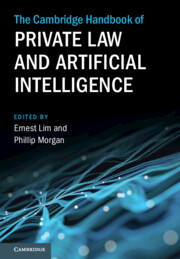Book contents
- The Cambridge Handbook of Private Law and Artificial Intelligence
- Reviews
- The Cambridge Handbook of Private Law and Artificial Intelligence
- Copyright page
- Dedication
- Contents
- Figures
- Table
- Contributors
- Acknowledgements
- Abbreviations
- Introduction
- 1 AI for Lawyers
- 2 Computable Law and AI
- Part I Law of Obligations
- 3 Contract Law and AI
- 4 Self-Driving Contracts and AI
- 5 Consumer Protection Law and AI
- 6 Tort Law and AI
- 7 Automated Vehicle Liability and AI
- 8 Legal Causation and AI
- 9 Product Liability Law and AI
- 10 Appropriation of Personality in the Era of Deepfakes
- 11 Agency Law and AI
- 12 Trust Law and AI
- 13 Unjust Enrichment Law and AI
- Part II Property
- Part III Corporate and Commercial Law
- Part IV Comparative Perspectives
- Index
13 - Unjust Enrichment Law and AI
from Part I - Law of Obligations
Published online by Cambridge University Press: 21 March 2024
- The Cambridge Handbook of Private Law and Artificial Intelligence
- Reviews
- The Cambridge Handbook of Private Law and Artificial Intelligence
- Copyright page
- Dedication
- Contents
- Figures
- Table
- Contributors
- Acknowledgements
- Abbreviations
- Introduction
- 1 AI for Lawyers
- 2 Computable Law and AI
- Part I Law of Obligations
- 3 Contract Law and AI
- 4 Self-Driving Contracts and AI
- 5 Consumer Protection Law and AI
- 6 Tort Law and AI
- 7 Automated Vehicle Liability and AI
- 8 Legal Causation and AI
- 9 Product Liability Law and AI
- 10 Appropriation of Personality in the Era of Deepfakes
- 11 Agency Law and AI
- 12 Trust Law and AI
- 13 Unjust Enrichment Law and AI
- Part II Property
- Part III Corporate and Commercial Law
- Part IV Comparative Perspectives
- Index
Summary
Unjust enrichment is a plausible cause of action for individuals whose data has been collected and used without their consent, to train, develop, or improve AI systems, or which has been sold for such purposes. Disgorgement of profits may be possible in some situations where the defendant has unlawfully collected or used personal data. Gain-based remedies have a number of advantages in this context, including the fact that it may be relatively easy to ascertain the gain, but demonstrating the loss will be considerably harder. However, contractual pre-emption may limit the utility of claims for unjust enrichment.
- Type
- Chapter
- Information
- Publisher: Cambridge University PressPrint publication year: 2024

